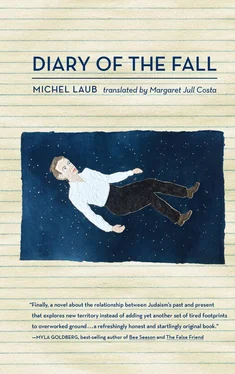31.
I arrive at Porto Alegre airport alone. My parents no longer live in the same part of town as when I was fourteen. The streets are all tarmacked, and the city is busier, and the cars are new and the people are different and I know hardly any of the shops and bars and restaurants and pharmacies and buildings that seemed to have sprung up at an unstoppable, predatory rate.
32.
I rang the buzzer. The lobby is furnished with rugs and a leather sofa. I hadn’t said I was coming, and my mother was waiting for me when the lift door opened. She’d gone with my father to see the doctor and suspected that the doctor would get in touch with me about the tests if anything was wrong, and why else would I be in Porto Alegre at that hour of the day, the sun in Porto Alegre isn’t the same as when I was fourteen, the air in Porto Alegre isn’t the same, the sound of the cars and the birds and the children playing behind a wall somewhere despite the news I had to give to my father and which was there on my mother’s face the moment she saw me.
33.
My mother took a step back and I was afraid she might fall, or was on the verge of fainting, because she realized that this was the final moment before everything else began to collapse, her years at my father’s side, the person she had been at my father’s side, and it’s that kind of reaction I’m talking about, the reaction of someone who really cares about another person, whether that person is their father or their best friend or their first or second or third wife, the way you feel and express yourself regardless of the shouting and the possibility that your third wife is about to leave you, the conversation she and I had after that last early-morning argument, when we finally reached our limit, had gone as far as we were capable of going, the plea from my third wife that marked perhaps the final act of my marriage.
34.
The plea, the same one I’d been hearing since I was fourteen, at different times and in the mouths of different people, and there’s no point now describing each of those circumstances because they’re no different from what one would normally expect in such cases, and I would again have to speak of people who had left because they couldn’t bear to witness what I did during those almost three decades, and it’s amazing how you can build a career and write books and get married three times and wake up every morning despite what you have repeatedly done during those almost three decades, my third wife’s plea was, of course, for me to stop drinking.
35.
In the long term drink slows down your reflexes, but that wasn’t why my third wife made that plea. People who drink are prone to developing gastritis, stomach ulcers, hepatitis, heart problems and high blood pressure, chronic malnutrition, bipolar disorder, cirrhosis of the liver and generalized organ failure, but that wasn’t why she said she would leave if I didn’t listen to her. My third wife knew my history, and I could have said that I was ill and argued that I wasn’t in control of my actions, and alleged that the reason I was still drinking was because of João and the memory of the last day I spoke to him, me sitting in my room with that bottle of whisky, the first and last time that I wept over what I would become from then on, a solitary, silent weeping, with no sense of pride or relief, I could have alleged whatever I liked, but that wasn’t the problem: it wasn’t simply a matter of choice or willpower, but the condition laid down by my third wife if I was to stay with her, knowing that staying would mean going ahead with the idea of us having a child.
1.
It’s impossible to read my father’s memoir without seeing in it a reflection of my grandfather’s notebooks. Both men decided to devote their final years to the same kind of project, and it would be absurd to suggest that this was pure coincidence, but in certain very specific ways the tone they adopt is utterly different.
2.
Did my father have an objective in writing down his memories, sending me a message he had never managed to convey to me in forty years? Ever since I went to see him in Porto Alegre to give him the news about Alzheimer’s I’ve been wondering if such a thing would even be possible after so much time, or after any amount of time, a few words or a whole book intended to change the way a son feels about his father, something a son knows from the moment he’s born, the judgment he silently makes when he’s still so fragile and entirely dependent on his father’s love, and there’s no point in the father spending the rest of his years trying to redeem himself for being distant or indifferent or for deliberately or accidentally withholding his love, because that first memory is what will have lodged in the son’s mind, whatever age he might be.
3.
From the age of fourteen on, my father never stopped feeling what he had always felt about my grandfather, and I imagine that the discovery of the notebooks did little to change that, because while my grandfather’s memoir can be summed up in the phrase the world as it should be , which presupposes an opposite idea: the world as it really is , I’m sure my father knew this long before he read it, that for my grandfather the real world meant Auschwitz, and if Auschwitz is the greatest tragedy of the twentieth century, which makes it the greatest tragedy of all centuries, given that the twentieth century is considered the most tragic of all, because never have so many people been bombed, shot, hanged, impaled, drowned, butchered or electrocuted before being burned or buried alive, two million in Cambodia, twenty million in the Soviet Union, seventy million in China, hundreds of millions if one includes Angola, Algeria, Armenia, Bosnia, Bulgaria, Chechnya, Chile, the Congo, Cuba, Czechoslovakia, Egypt, El Salvador, Ethiopia, Haiti, Honduras, Hungary, India, Indonesia, Iran, Iraq, Korea, Lebanon, Libya, Mexico, Myanmar, Pakistan, Palestine, the Philippines, Poland, Portugal, Romania, Rwanda, Sierra Leone, Somalia, Spain, Sri Lanka, Sudan, Tibet, Turkey and Vietnam, an accumulation of corpses, a pile reaching up to the sky, the history of the world as nothing but an accumulation of massacres that lie behind every speech, every gesture, every memory, and if Auschwitz is the tragedy that contains in its essence all those other tragedies, it’s also in a way proof of the nonviability of human experience at all times and in all places — in the face of which there is nothing one can do or think, no possible deviation from the path my grandfather followed during those years, the same period in which my father was born and grew up, unable ever to change that certain fate.
4.
The nonviability of human experience at all times and in all places was a concept freely available to my father. He had more right than anyone to grasp it in order to justify whatever attitude he chose to take during his life: he could have become the worst boss and the worst friend and the worst husband and the worst father because when he was fourteen he came face-to-face with that concept, with my grandfather slumped across the desk, and then there was the fight we had when I decided to change schools and the conversation we had by the barbecue, and the way he reacted to my going to university and my move to São Paulo, my three marriages and the day I told him he had Alzheimer’s, all those things could have been very different, and I wouldn’t be speaking about him now because I would have judged him already, and as was the case with him and my grandfather I would have nothing good to say about him, and as was the case with him and my grandfather I would feel no affection or empathy, and I would never have felt what a son naturally feels about his father without ever having to say or explain anything.
Читать дальше












